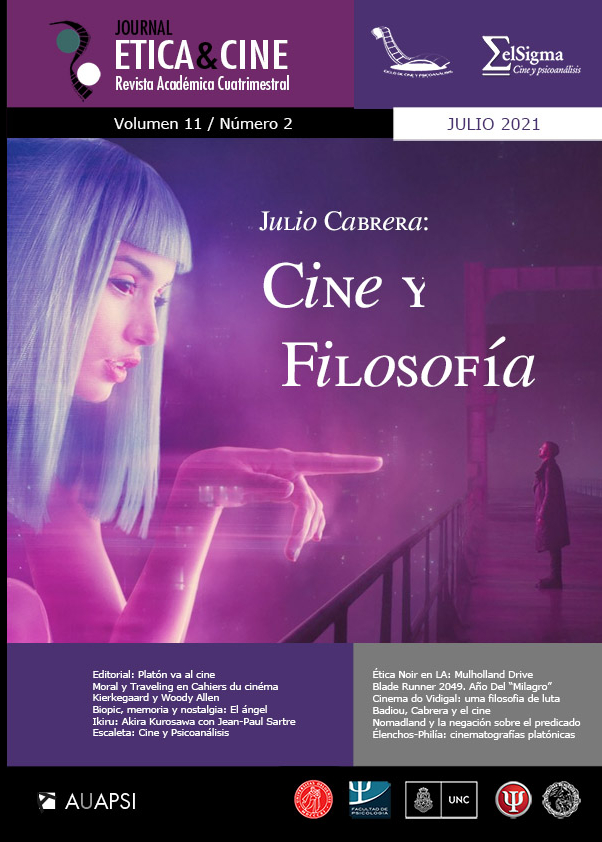Biopic, memory and nostalgia: a criminal’s biography
DOI:
https://doi.org/10.31056/2250.5415.v11.n2.34184Keywords:
Argentine cinema, Biographical cinema, Biopic, Memory, NostalgiaAbstract
The article reflects on the biopic genre in relation to history, memory and nostalgia, based on the case of the Argentine film El Ángel (Luis Ortega, 2018), based on the life of serial killer Carlos Robledo Puch and his crimes in the early 1970s. The film slides from the biographical account to a broader scope: that of reflection –in a pop style– about evil. The biography of Robledo Puch works as an excuse to tell a story that deals with the problems of evil and freedom, beauty and perversion, violence and eroticism, as the reverse of the “normal” life, the gray existence of the social majorities that remain anonymous. With a nostalgic approach to the 70’s, Ortega’s biopic uses Robledo’s name and some historical circumstances to give identity to a character with a mythical essence.
Downloads
References
Arfuch, L. (2002). El espacio biográfico. Dilemas de la subjetividad contemporánea. Fondo de Cultura Económica.
Basile, E. (2018, 5 de agosto). “Luis Ortega: ‘Queríamos echar luz sobre esa parte descontrolada de la infancia que busca límites, que es distinto a hacer el mal’”. Escribiendo Cine. http://www.escribiendocine.com/entrevista/0015078-luis-ortega-queriamos-echar-luz-sobre-esa-parte-descontrolada-de-la-infancia-que-busca-limites-que-es-distinto-a-hacer-el-mal/
Bataille, G. (1997). El erotismo. Tusquets.
Bingham, D. (2010). Whose lives are they anyway? The biopic as contemporary film genre. Rutgers University Press.
Caetano, I. A. (2002). Un oso rojo [película]. Lita Stantic Producciones.
Carabajal, G. (2008, 29 de junio). ‘“Nunca asesiné a nadie’, asegura Robledo Puch”. La Nación. https://www.lanacion.com.ar/1025783-nunca-asesine-a-nadie-asegura-robledo-puch
Cines Argentinos (2018, 7 de agosto). “El ángel logra el récord de cantidad de salas para el cine argentino”. https://www.cinesargentinos.com.ar/noticia/5711-el-angel-logra-el-record-de-cantidad-de-salas-para-el-cine-argentino/
Custen, G. (1992). Bio/pics: How Hollywood Constructed Public History. Rutgers University Press.
Ducrot, O.; Todorov, T. (1995). Diccionario enciclopédico de las ciencias del lenguaje. Siglo XXI.
Foucault, M. (1996). La vida de los hombres infames. Altamira.
Genette, G. (1989). Palimpsestos. La literatura en segundo grado. Taurus.
Hassler-Forest, D. (2013). “American Splendor: Narrative and Biography between Media”. Passepartout, vol. 18, N° 34, pp. 263-281.
Jameson, F. (2002). El giro cultural. Escritos seleccionados sobre el posmodernismo 1983-1998. Manantial.
Landy, M. (1991). British Genres: Cinema and Society, 1930–1960. Princeton University Press.
Lavabre, M.C. (2007). “Maurice Halbwachs y la sociología de la memoria”. En Pérotin-Dumon, Anne (dir.). Historizar el pasado vivo en América Latina. http://etica.uahurtado.cl/historizarelpasadovivo/es contenido.php
Ledo, R. (1995). Sin condena [serie de televisión]. Canal 9.
Martel, L. (2017). Zama [película]. Rei Cine, El Deseo, Canana Films, KNM, Bananeira Filmes, Louverture Films, Netherland Filmfund, INCAA.
Mazzini, M. (2017, 27 de septiembre). “Lucrecia Martel: ‘No puedo avalar con mi película las fantasías violatorias’”. Brando. https://www.lanacion.com.ar/2066908-lucrecia-martel-no-puedo-avalar-con-mi-pelicula-las-fantasias-violatorias
Moulin, J. (2016). “Biophoty: The Biofilm in Biography Theory”. Revue LISA/LISA e-journal, vol. XIV, N° 2. https://doi.org/10.4000/lisa.8959
Ortega, L. (2018). “Hay que matar hasta a los amigos”, prólogo a Palacios, Rodolfo: El ángel negro. La feroz vida de Carlos Robledo Puch. Sudamericana.
Palacios, R. (2018). El ángel negro. La feroz vida de Carlos Robledo Puch. Sudamericana.
Prividera, N. (2018, 21 de agosto). “Un muchacho como yo. A propósito de El ángel”. Con los ojos abiertos. www.conlosojosabiertos.com/inconformista-02-la-colulmna-nicolas-prividera-muchacho-proposito-angel/
Rancière, J. (2010). “La imagen intolerable”. En El espectador emancipado. Manantial.
Renders, H.; De Haan, B.; Harmsma, J. (eds.) (2017). The Biographical Turn: Lives in History. Routledge.
Robinson, M. (2016). Mapping the British biopic: Evolution, Conventions, Reception and Masculinities [tesis doctoral, University of the West of England]. http://eprints.uwe.ac.uk/29205
Rosenstone, R. (2006). History on Film/Film on History. Pearson Longman.
Ortega, L. (2018). El ángel [película]. K&S Films, Underground Contenidos, El Deseo, Telefe, INCAA.
Piñeyro, M. (2000). Plata quemada [película]. K&S Films, Cuatro Cabezas, Tornasol Films, Mandarina Films, Taxi Films.
Safranski, R. (2000). El mal o el drama de la libertad. Tusquets.
Sarlo, B. (2005). Tiempo pasado. Cultura de la memoria y giro subjetivo. Siglo XXI.
Simmel, G. (1988). Sobre la aventura. Ensayos filosóficos. Península.
Tonkonoff, S. (2008). “La sociología criminal de Gabriel Tarde”. Delito y Sociedad. Revista de Ciencias Sociales, N° 26, pp. 37-57. https://doi.org/10.14409/dys.v2i26.5295
White, H. (1992). El contenido de la forma. Narrativa, discurso y representación histórica. Paidós.
Downloads
Published
How to Cite
Issue
Section
License

This work is licensed under a Creative Commons Attribution-ShareAlike 4.0 International License.
Los autores que publiquen en Ética y Cine Journal aceptan las siguientes condiciones:
Los autores/as conservan los derechos de autor © y permiten la publicación a Ética y Cine Journal, bajo licencia CC BY-SA / Reconocimiento - Reconocimiento-CompartirIgual 4.0 Internacional. La adopción de esta licencia permite copiar, redistribuir, comunicar públicamente la obra, reconociendo los créditos de la misma, y construir sobre el material publicado, debiendo otorgar el crédito apropiado a través de un enlace a la licencia e indicando si se realizaron cambios.

Este obra está bajo una licencia de Creative Commons Reconocimiento-CompartirIgual 4.0 Internacional.




